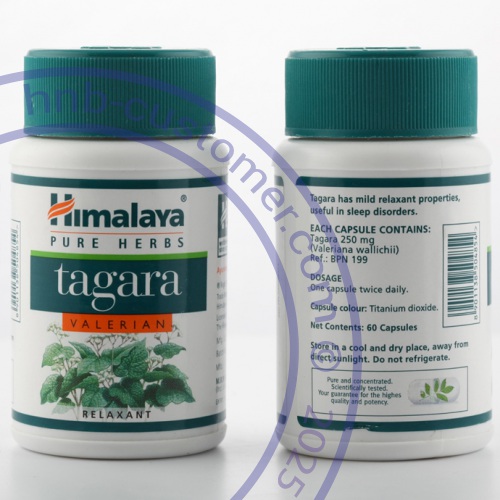Tagara bottle
What is this herbal medicine?
In Ayurvedic medicine, TAGARA (Indian Valerian/Valeriana wallichi ) is recommended for insomnia, stimulating the nervous system, reducing spasms and calming anxiety. Records show that the herb has been medicinally used in the 16th century in India to treat nervousness, trembling, delirium tremens (acute delirium), headaches and heart palpitations. In recent times, the United States Food and Drug Administration (USFDA) has listed Tagara in their ‘Generally Recognized As Safe (GRAS)’ list, while the German Commission E has approved its use as a mild sedative. Tagara is popular in North America, Europe and Japan and is widely used to treat insomnia and anxiety. Tagara is a perennial, herbaceous plant, indigenous to India, and is found in the temperate Himalayan region.
Active constituents
The roots and rhizomes are highly aromatic and contain valepotriates and essential oils. In addition, sesquiterpenoids, monoterpenoids, lignans and alkaloids with pharmacological properties have been found in Tagara. Hesperidin and methylapigenin present in Tagara are found to have sedative and sleep enhancing properties. Valerenic acid present in the herb has been shown to inhibit the enzyme-induced breakdown of gamma-aminobutyric acid (GABA), the brain's chief inhibitory neurotransmitter. This action results in sedation.
Herb functions:
- Insomnia: The sedative action of Tagara mildly depresses the central nervous system, which is beneficial in sleep disorders like insomnia.Six-methylapigenin, which is an active compound of Tagara, acts as a benzodiazepine-binding site (BDZ-bs) ligand. This action enhances the inhibitory effects of GABA, leading to the complete blockage of the ongoing nerve impulse and sedation.
- Nervine disorders: Tagara maintains normal nervine function and is also used in treating anxiety and tremors. It relieves nervous irritation and agitation. In studies, extracts of Tagaramarkedly attenuated cerebral injury in terms of decreased brain infarct (an area of dead tissue due to lack of oxygen) size, and an increase in short-term memory and motor coordination.
- Antidepressant and anxiolytic action: Tagara extract is useful in the treatment of human stress-related disorders. It significantly reduces stress and anxiety, relieves depression, and enhances the willingness to adjust without altering memory, concentration or attention.
Indications:
- Insonmia
- Sleep disorders
Contraindications:
None
Recommended dose:
One capsule, twice a day or as directed by your physician
Composition
Each capsule contains 250mg extract of Tagara
Note: The information on this page is not intended to be a substitute for professional medical advice. Do not use this information to diagnose or treat your problem without consulting your doctor.





